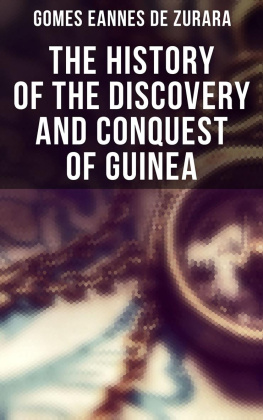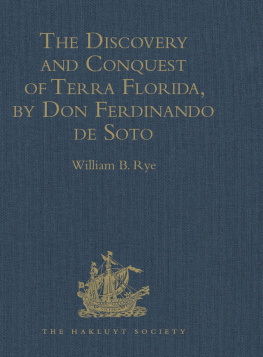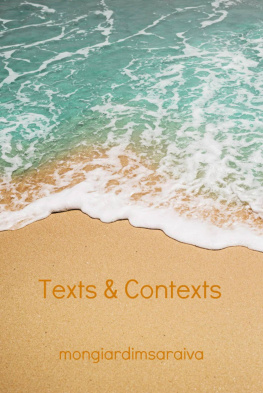EDITORS' PREFACE.
The following translation of Azurara's Chronicle of the Discovery and Conquest of Guinea is the first complete English version that has appeared of the chief contemporary authority for the life-work of Prince Henry of Portugal, surnamed the Navigator; and we may remind members of the Hakluyt Society, and other readers, that we have but lately passed the fifth centenary of the Prince's birth (March 4th, 1394).
The first volume includes about half of the text, together with an Introduction on the Life and Writings of Azurara, which it is hoped will be found more exhaustive and accurate than any previous notice of the historian.
In the second volume (which is due for the year 1897) will be given the rest of the Chronicle, with an Introduction on the Geographical Discoveries of the Portuguese, and Prince Henry's share in the same. It will also contain notes for the explanation of historical and other questions arising out of certain passages in the text of both volumes. To illustrate the condition of geographical knowledge in the period covered by the present instalment, we have included four reproductions of contemporary (or almost contemporary) maps: (1) Africa, according to the Laurentian Portolano of 1351 in the Medicean Library at Florence. This is the most remarkable of all the Portolani of the fourteenth century. Its outline of W. and S. Africa, and more particularly its suggestion of the bend of the Guinea Coast, is surprisingly near the truth, even as a guess, in a chart made one hundred and thirty-five years before the Cape of Good Hope was first rounded. (2) N.W. Africa, the Canary Isles, etc., according to the design of the Venetian brethren Pizzigani, in 1367. (3) The same according to the Catalan Map of 1375 in the Bibliothque Nationale at Paris. The interior of Africa is filled with fantastic pictures of native tribes; the boatload of men off Cape Bojador in the extreme S.W. of the map probably represents the Catalan explorers of the year 1346, whose voyage in search of the "River of Gold" this map commemorates. (4) The same, with certain other parts of the world, according to Andrea Bianco in 1436. In the succeeding volume, we hope to offer some illustrations of the cartography of Prince Henry's later years, as well as a likeness of the Prince himself, either from the Paris portrait (MSS. Port. 41, fol. 5 bis) or from the statue at Belem. We had expected to be able to furnish our readers with a copy of the portrait of the Prince from the important oil-painting on board preserved in a corridor of the extinct monastery adjoining the Church of S. Vicente de Fra in Lisbon, but the photograph, which was taken by Senhor Camacho with the permission of His Eminence the Cardinal Patriarch, proved unsatisfactory, owing to the position of the picture and want of sufficient light.
We may add that a considerable part of the Paris manuscript of the Chronicle of Guinea has been collated for the present edition with the printed text as published by Santarem, and the result proves the accuracy of the latter.
We have to thank Senhor Jayme Batalha Reis, who has looked through the present version as far as the end of vol. i, and has kindly offered many suggestions. Among other Portuguese scholars who have been of service to us, we would especially mention Dr. Xavier da Cunha, of the Bibliotheca National, Lisbon; Senhor Jos Basto, of the Torre do Tombo, and General Brito Rebello. In a lesser degree we owe our acknowledgments to D. Carolina Michalis de Vasconcellos and Dr. Theophilo Braga, the chief authorities on all that pertains to Portuguese literature, as well as to the late Conselheiro J. P. de Oliveira Martins, whose untimely death robbed his country of her foremost man of letters.
C. R. B.
E. P.
October, 1896.
THE LIFE AND WRITINGS OF AZURARA.
Life.
"Lidar sem descano parece ter sido o moto d'Azurara."
Vieira de Meyrelles.
The materials at hand for a study of the life and work of the second great Portuguese Chronicler are, considering the age in which he lived and the position he held, somewhat disappointing, and no one of his countrymen has been at the pains to work them up satisfactorily. They naturally fall into three divisionshis own writings, documents directly relating to his life or merely signed by him in his official capacity, and the witness of historians. There exists but one contemporary description of Azurara, that by Mattheus de Pisano, author of the Latin history of the Capture of Ceuta, though this is supplemented by the contents of two letters addressed to the Chronicler by Affonso V and the Constable D. Pedro respectively, as well as by what can be gleaned from documentary sources and from Azurara himself. In the next centurythe 16thsome assistance may be derived from the traditions preserved by Barros, the historian of the Indies, as also from his critical judgments together with those of Damio de Goes, the famous Humanist and friend of Erasmus. These are all in a sense primary authorities, while the others who have discoursed of, or incidentally mentioned him are but secondary, namely, Nicolau Antonio, Jorge Cardoso, Barbosa Machado, Joo Pedro Ribeiro, the Viscount de Santarem, Alexandre Herculano, Vieira de Meyrelles, Innocencio da Silva, Sotero dos Reis, and Rodriguez d'Azevedo.
Gomes Eannes de Azurara, to give the modern spelling of his name, though he always signed himself simply "Gomes Eanes" or "Gomes Annes",1 was the son of Joo Eannes de Azurara, a Canon of Evora and Coimbra; but, beyond the fact of this paternity, we know nothing of his father, and only by conjecture is it possible to arrive at the name of his mother, as will hereafter appear. He is said to have come of a good family, on the ground of his admission into the Order of Christ.
As with several other Portuguese men of letters, the respective years of Azurara's birth and death are unknown,2 and two localities dispute the honour of having given him to the world; but there seems little doubt that this "bonus Grammaticus, nobilis Astrologus, et magnus Historiographus," as his friend Pisano calls him,3 was born in the town of his name, in the Province of Minho, at the very commencement of the 15th century. In proof of this it should be stated that Azurara expressly declares in his Chronica de Ceuta, which was finished in 1450, that he had not passed "the three first ages of man" when he wrote it.4
The dispute as to his birthplace between the Azurara in Minho and the Azurara in Beira5 is not easy to settle, but tradition favours the former, and until the end of the last century no writer had ventured to doubt that the ancient town at the mouth of the River Ave, which received its first charter, or "foral", from the Count D. Henrique in 1102 or 1107, was the early home of the Chronicler.6 Such evidence as exists in favour of the latter place is slight, consisting only of inferences drawn from a document, dated August 23rd, 1454, in which Affonso V grants certain privileges to two inhabitants of Castello Branco, who were accustomed to collect the Chronicler's rents and bring them to Lisbon. From this it has been argued by such able critics as Vieira de Meyrelles and Rodriguez d'Azevedo that these rents must have issued out of family property situate at the Azurara in Beira, which happens to be in the district of Castello Branco, and hence that the Chronicler was a native of Beira rather than of Minho.7 The conclusion seems far-fetched, to say the least, for it is just as likely that these two men were agents for a benefice, or "commenda", at Alcains, in the same district, which Azurara possessed at the time this grant was made.8













